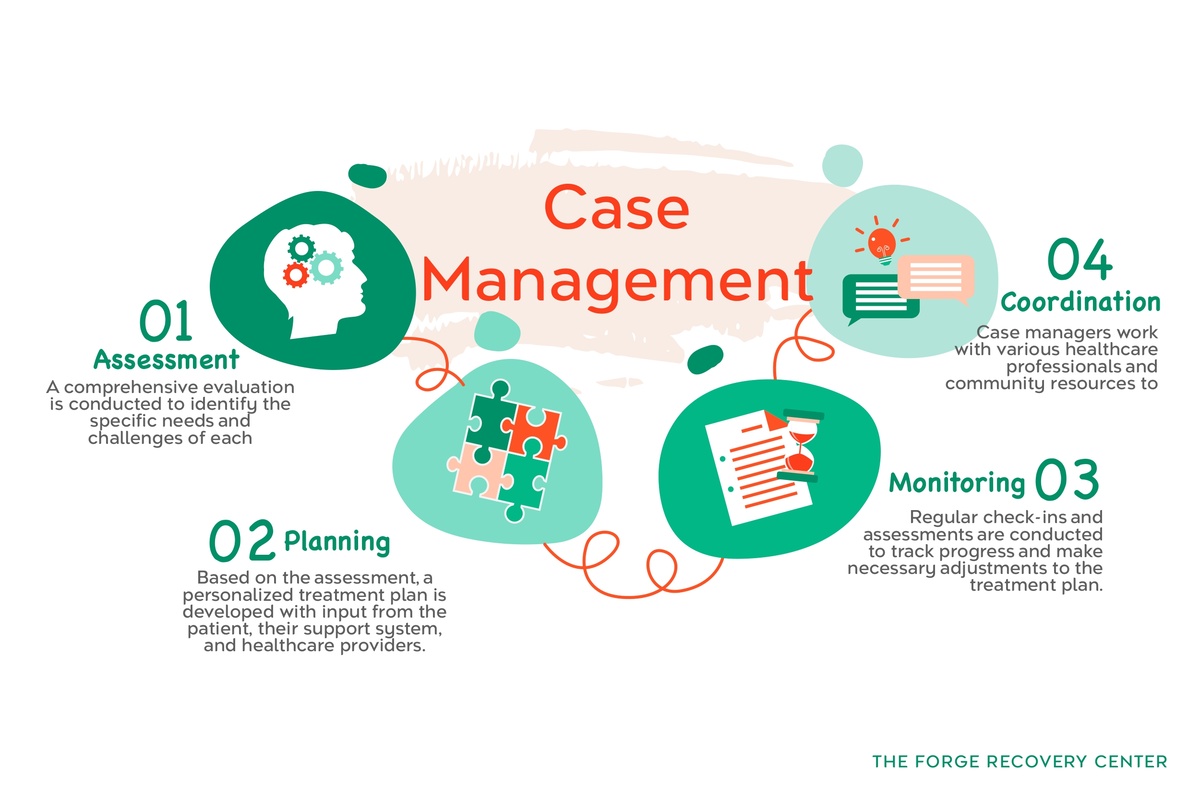Case Management: Overview & How Case Management Benefits Recovery


Case management, a pivotal aspect of healthcare and social work, ensures streamlined coordination of services for individuals in need. Dating back to the early 20th century, its roots lie in efforts to provide comprehensive support to vulnerable populations, particularly those dealing with addiction.
Today, this practice has evolved into a systematic treatment approach for addiction that optimizes resources, enhances client outcomes, and promotes efficiency within substance abuse treatment.
Case Management Overview: What Is Case Management?
Case management is a collaborative process that involves assessment, planning, coordination, and advocacy for services to meet your needs. It is designed to support you in achieving your goals by linking you with necessary resources and providing ongoing monitoring and support.
The Basics of Case Management
Case management involves coordinating care for individuals to optimize health outcomes and resource utilization efficiently. The primary goal is to ensure comprehensive and timely services tailored to each patient's needs. In addiction treatment, case management plays a crucial role in enhancing patient satisfaction and quality of care.
Case management focuses on assessing, planning, coordinating, implementing, and evaluating options to meet an individual's health needs. It aims to streamline communication between healthcare providers, patients, and families for better care coordination. This process is vital in ensuring patients receive the right care at the right time.
Facilitates seamless communication among healthcare providers
Enhances patient satisfaction through personalized care plans
Improves efficiency in resource allocation for optimal outcomes

Case Management: Defining the Role
A case manager is responsible for assessing patient needs, developing care plans, and coordinating services across various healthcare settings. Collaboration with interdisciplinary teams is crucial for successful case management. Effective collaboration ensures that all aspects of a patient's care are addressed comprehensively.
Collaboration in case management involves engaging with healthcare professionals, social workers, insurance companies, and community resources to provide holistic care. By working together, these stakeholders can address complex issues effectively. Successful collaboration leads to improved patient outcomes and satisfaction.
Responsibilities include assessing patient needs and developing care plans
Collaboration with interdisciplinary teams enhances the quality of care provided
Effective collaboration leads to improved patient outcomes and satisfaction
Philosophy Explored
The philosophy of case management revolves around advocacy, empowerment, and client-centered care. Case managers advocate for patients' rights while empowering them to make informed decisions about their health. Client wellness and autonomy are central principles that guide case management practices.
By promoting client wellness and autonomy, case managers aim to empower individuals to take charge of their health outcomes actively. Advocacy involves ensuring that patients' voices are heard throughout their healthcare journey. Resource management plays a vital role in securing necessary support systems for clients.
Advocates for patients' rights while promoting client empowerment
Focuses on client wellness and autonomy for active participation in healthcare decisions
Ensures access to necessary resources for optimal health outcomes
Are You Struggling with Mental Health or Addiction?
We Can Help. Call Us Now!
CALL: 877-839-1772
Case Managers Overview
Case managers serve as the primary point of contact for individuals and their families throughout the recovery process. They may come from various backgrounds such as social work, nursing, psychology, or counseling. Their role is to assess clients' needs, develop a comprehensive care plan, and ensure that all services are delivered effectively.

Who They Are
Case managers play a crucial role in coordinating services for individuals in need. Key stakeholders in case management include healthcare providers, social workers, and legal professionals. Diverse disciplines such as nursing, social work, and psychology contribute to effective case management. A professional case manager exhibits qualities like empathy, organization, and strong communication skills.
Skills Required
Essential skills for effective case management include organization, time management, and attention to detail. Communication skills are vital for conveying information clearly and building rapport with clients. Problem-solving abilities help in navigating complex situations efficiently. Empathy allows case managers to understand clients' perspectives, while cultural competence ensures respectful interactions with diverse populations.
Training and Background
To become a certified case manager, individuals typically need a bachelor's degree in fields like social work or nursing. Training programs offer specialized courses in areas such as care coordination and resource management. Continuous learning through workshops and seminars is essential for staying updated on best practices in the field of case management.
The Role of Case Managers in Drug Rehab
In drug and alcohol treatment, case managers serve as essential liaisons between clients, treatment providers, and other community resources. They work closely with clients to develop a personalized recovery plan that addresses their unique needs and challenges.
This may involve coordinating services such as detoxification programs, therapy sessions, medication management, and support groups.
Recovery Partner
Case managers act as recovery partners, offering continuous support to individuals undergoing drug rehab. They assist clients in setting and achieving recovery goals, providing guidance throughout the process. This partnership is crucial for maintaining motivation and accountability in the recovery journey.
A Source of Support
Case managers support clients by connecting them with resources such as counseling services, support groups, and vocational training programs. They play a pivotal role in advocating for clients' needs and ensuring they receive comprehensive care. By fostering a trusting relationship, case managers empower clients to make positive changes in their lives.
Working Together
The relationship between case managers and clients is collaborative in nature, emphasizing mutual respect and shared decision-making. Case managers work alongside clients to develop personalized treatment plans tailored to their unique circumstances. This collaborative approach fosters a sense of empowerment and ownership in the recovery process.
Clinical Aspects
In healthcare settings, case managers navigate clinical aspects by liaising with medical professionals to ensure clients receive appropriate care. Understanding medical terminology and procedures is essential for effective communication and coordination of services. Case managers play a vital role in translating complex medical information into accessible language for clients.
Case managers are responsible for coordinating care with healthcare providers, facilitating appointments, and monitoring treatment progress. They serve as advocates for clients within the healthcare system, addressing any barriers to treatment or gaps in care. By bridging the gap between clients and healthcare professionals, case managers ensure seamless continuity of care.
Team Interventions
Case management teams engage in collaborative interventions to address the multifaceted needs of clients. By pooling together diverse expertise from various disciplines, these teams offer holistic support that considers all aspects of a client's well-being. This multidisciplinary approach enhances the effectiveness of interventions by incorporating different perspectives and strategies.
The benefits of multidisciplinary teamwork in case management include improved coordination of services, enhanced communication among team members, and comprehensive assessment of client needs. Team interventions promote synergy among professionals from different backgrounds, leading to more integrated and impactful care delivery.
Team interventions not only improve the quality of care but also foster innovation and creativity in problem-solving. By leveraging the collective knowledge and skills of team members, case management teams can devise tailored solutions that address each client's unique challenges effectively.
Are You Struggling with Mental Health or Addiction?
We Can Help. Call Us Now!
CALL: 877-839-1772
Daily Responsibilities of Case Management
Case managers have a multifaceted role that involves various tasks to ensure effective care coordination.
Client Assessment
Client assessments involve gathering information about clients' needs, preferences, and challenges through interviews and evaluations. This process helps in understanding the client's current situation comprehensively. The data collected guides case managers in tailoring interventions to meet individual requirements.
Identifying client needs and goals is crucial for developing effective care plans. By recognizing what clients require and aspire to achieve, case managers can create strategies that address specific concerns. This ensures that the care provided is targeted towards supporting the client's well-being.
Client assessment plays a pivotal role in developing personalized care plans by providing insights into the client's unique circumstances. It enables case managers to design interventions that are customized to meet individual needs effectively. By considering the assessment findings, case managers can offer tailored support that aligns with the client's objectives.
Plan Development
Developing individualized care plans involves collaborating with clients to establish achievable objectives. Case managers work closely with clients to set realistic goals based on their aspirations and capabilities. This collaborative approach ensures that the care plan is attainable and beneficial for the client.
Collaboration between case managers and clients is essential in creating actionable care plans that address specific needs. By involving clients in the planning process, case managers gain valuable insights into their preferences and priorities. This partnership fosters a sense of ownership and empowerment in clients regarding their care journey.
Setting realistic goals and objectives is paramount in plan development to ensure that interventions are meaningful and impactful. By establishing clear targets, case managers provide clients with a roadmap for progress and improvement. Realistic goals motivate clients to actively engage in their care plans and strive toward positive outcomes.
Progress Monitoring
Monitoring client progress involves regularly reviewing milestones and outcomes to assess the effectiveness of interventions. Case managers track client achievements against set goals to gauge progress accurately. This ongoing evaluation helps in identifying areas of success and areas needing further attention.
Tracking milestones and achievements is essential for measuring client progress over time accurately. By documenting successes and challenges, case managers can evaluate the efficacy of interventions objectively. This data-driven approach enables informed decision-making regarding adjustments to care plans based on real-time feedback.
Progress monitoring informs adjustments to care plans by highlighting areas where modifications may be necessary for better outcomes. By analyzing client progress data, case managers can identify trends, obstacles, or opportunities for improvement. This proactive approach ensures that care plans remain dynamic and responsive to evolving client needs.

Addressing Client Concerns
Case managers also play a crucial role in addressing client concerns and challenges throughout the recovery process. They act as advocates for clients, ensuring they receive the best possible care and support. In case of any issues or obstacles, case managers work closely with clients to find solutions and provide ongoing support.
Individual Needs
Case managers play a crucial role in identifying and addressing diverse individual needs. They cater to specific client requirements by tailoring services accordingly. Case managers advocate for clients' unique needs, ensuring personalized care and support.
Providing emotional support is essential for clients undergoing challenging situations. Emotional well-being significantly impacts overall recovery outcomes. Case managers employ various strategies to offer empathetic support, fostering a positive environment for clients.
Crisis Management
In crisis situations, case managers step in to provide crucial intervention and manage the situation effectively. Preparedness and quick response are key in handling crises promptly. Case managers implement strategies to ensure client safety and well-being during emergencies.
Are You Struggling with Mental Health or Addiction?
We Can Help. Call Us Now!
CALL: 877-839-1772
Significance in Recovery
There is no universal approach to substance abuse treatment, and different individuals have varying needs. Case management helps address these individual needs by providing personalized support and resources. This tailored approach greatly increases the chances of successful recovery.
Overcoming Isolation
Case managers play a crucial role in helping clients overcome feelings of isolation by providing emotional support and guidance. They actively encourage social connections through group activities and community events, fostering a sense of belonging. By engaging clients in various social interactions, case managers aim to reduce loneliness and enhance their overall well-being.
On top of that, case managers emphasize the importance of community engagement, encouraging clients to participate in local initiatives and programs. This involvement not only helps clients build meaningful relationships but also strengthens their ties to the community. By promoting active participation, case managers create opportunities for clients to develop a supportive network outside of formal treatment settings.
Support System Role
Case managers work closely with clients' support systems, including family members, friends, and other caregivers, to ensure comprehensive care. By involving these key individuals, case managers enhance the impact of interventions and treatments on client outcomes. Family and community support provide additional layers of assistance and encouragement, contributing significantly to the overall recovery process.
Moreover, case managers adopt a collaborative approach when engaging with support systems, recognizing the collective effort required for successful client outcomes. By fostering open communication and cooperation among all involved parties, case managers create a unified support network that is instrumental in addressing clients' needs effectively.
Long-Term Impact
The long-term effects of effective case management are profound, leading to sustained improvements in clients' well-being and quality of life. Positive outcomes achieved through comprehensive care are not just temporary but have lasting benefits that extend far beyond initial interventions. Case management ensures that clients receive ongoing support and resources even after formal treatment ends.
Furthermore, continuous assessment of long-term impact informs strategies for improving care delivery over time. By tracking outcomes and evaluating progress regularly, case managers can identify areas for enhancement and adjust their approaches accordingly. This commitment to continuous improvement ensures that clients receive the best possible care tailored to their evolving needs.
How Case Management Benefits Clients
Case management offers numerous benefits for individuals in recovery.
Enhanced Recovery
Case management significantly enhances the recovery process for clients by providing personalized support and guidance. Case managers play a crucial role in coordinating various aspects of a client's recovery journey, ensuring a comprehensive and effective approach. They work closely with clients to set achievable goals and monitor progress toward sustainable recovery outcomes. By offering continuous support and encouragement, case managers empower clients to overcome challenges and achieve lasting positive changes in their lives.
A Holistic Approach
Furthermore, case managers adopt a holistic approach that takes into account all aspects of a client's well-being. This comprehensive strategy ensures that clients receive comprehensive support to address not only their immediate recovery needs but also their long-term health and wellness goals. By focusing on the physical, emotional, and social aspects of recovery, case managers help clients build resilience and develop coping strategies that promote overall well-being.
Improved Well-Being
The involvement of case management leads to a significant improvement in clients' overall well-being by addressing their unique needs and challenges. Through regular assessments and personalized care plans, case managers tailor their support to enhance clients' quality of life. By recognizing the connection between well-being and quality of life, case managers prioritize interventions that promote mental health, emotional stability, and social connections.
Implementing Strategies
Moreover, case managers implement various strategies to improve clients' physical and mental health outcomes. These strategies may include facilitating access to healthcare services, advocating for mental health support, promoting healthy lifestyle choices, and encouraging self-care practices. By fostering a supportive environment focused on holistic well-being, case managers empower clients to lead fulfilling lives free from the constraints of their past struggles.
Resource Access
Facilitating access to resources and services is a fundamental aspect of effective case management for clients seeking support. Case managers play a pivotal role in connecting clients with community resources such as housing assistance, employment programs, educational opportunities, and healthcare services. By establishing these vital connections, case managers enable clients to access the necessary tools and support systems needed to address their needs effectively.
Improved resource access enhances clients' ability to navigate complex systems and overcome barriers to care. Case managers act as advocates for their clients, ensuring they receive timely assistance and support in accessing essential services. This proactive approach not only streamlines the process of obtaining resources but also empowers clients to take control of their recovery journey with confidence.

Are You Struggling with Mental Health or Addiction?
We Can Help. Call Us Now!
CALL: 877-839-1772
Success Stories
The effectiveness of case management in substance abuse treatment is reflected in numerous success stories. For example, a study by the Substance Abuse and Mental Health Services Administration (SAMHSA) found that individuals who received case management services were more likely to complete treatment and maintain abstinence compared to those who did not receive these services.
Recovery Journeys
Clients undergoing case management often experience remarkable outcomes throughout their recovery journeys. From overcoming addiction to managing mental health conditions, these stories exemplify resilience and determination. One client, struggling with substance abuse, embarked on a challenging road to sobriety under the guidance of a dedicated case manager.
Throughout the recovery process, clients face various challenges, including relapses and setbacks. However, with unwavering support from their case managers, they navigate these obstacles and emerge stronger. The journey is not without its triumphs, as clients celebrate small victories that pave the way for long-term success.
The pivotal role of case managers in these recovery journeys cannot be overstated. They provide personalized support, guidance, and resources tailored to each client's unique needs. By fostering a trusting relationship, case managers empower clients to take ownership of their recovery and make positive changes in their lives.
Milestones Achieved
Under the guidance of case management, clients achieve significant milestones that mark their progress toward recovery. Whether it's securing stable housing, obtaining employment, or reuniting with family members, these milestones signify tangible progress and growth. Recognizing these achievements is crucial in boosting clients' confidence and self-esteem.
Each milestone achieved serves as a testament to the dedication and hard work put forth by both clients and their case managers. By acknowledging these accomplishments, clients are motivated to continue their journey toward holistic wellness. These milestones act as beacons of hope, inspiring others to believe in the possibility of transformation through dedicated support.
Celebrating milestones not only acknowledges the progress made but also reinforces the importance of perseverance and resilience in the face of adversity. Clients draw strength from these achievements, propelling them forward on their path to recovery. By recognizing and honoring each milestone reached, clients are encouraged to set new goals and strive for continued growth.
Closing Remarks
You've learned about the crucial role of case managers in drug rehab, from their daily responsibilities to the benefits they bring to clients. Their dedication and support play a significant part in the recovery journey, addressing client concerns and continuously striving for improvement. Success stories highlight the positive impact case management has on individuals seeking help.
As you continue exploring the world of drug rehabilitation, remember the essential role case managers play in providing personalized care and guidance. Their commitment to your well-being can make a profound difference in your recovery journey. Consider reaching out to a case manager if you or someone you know needs support in overcoming addiction.

Our Case Managers Are Your Companions
Drug addiction makes you feel like you're truly alone. As a family-owned addiction center, The Forge Recovery Center understands that above all else. When we developed our effective treatment programs for addiction and mental health, we made sure our team acted like companions and teachers for our clients.
At The Forge Recovery Center, we've carefully created a warm, welcoming, and safe space for recovery. Placing a special focus on community and guided with a trauma-informed approach, we're the ideal place to explore addiction at the roots -- and treat it.
If you're struggling with addiction, you're not alone. Come join a community that's dedicated to recovery. Contact The Forge Recovery Center today to learn more.



